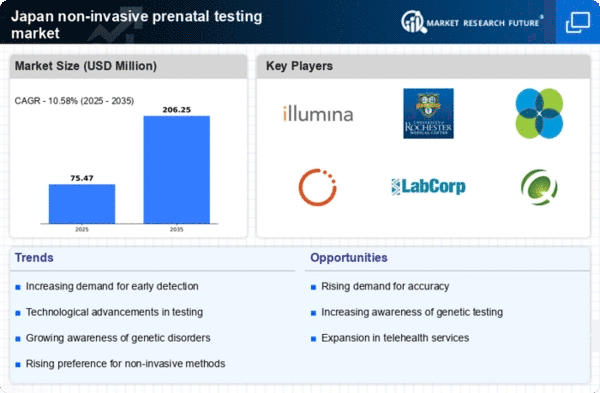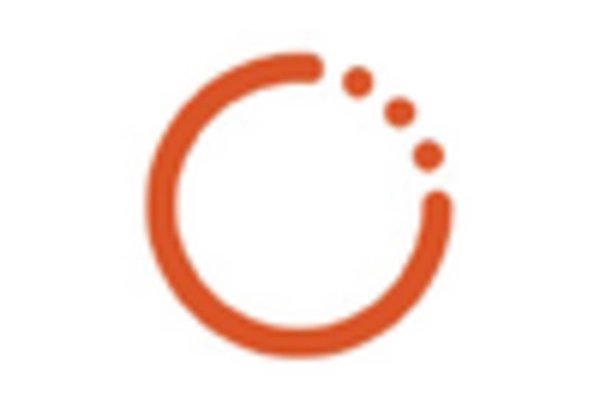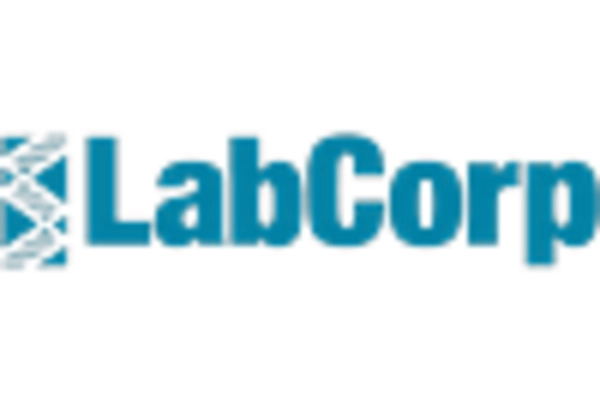Rising Birth Rates in Japan
The non invasive-prenatal-testing market is experiencing growth due to the rising birth rates in Japan. Recent statistics indicate that the birth rate has shown a slight increase, which may lead to a higher demand for prenatal testing services. As more expectant mothers seek to ensure the health of their unborn children, the market for non invasive prenatal testing is likely to expand. This trend is further supported by the increasing number of women choosing to have children later in life, which often necessitates more comprehensive prenatal care. The combination of these factors suggests a robust future for the non invasive-prenatal-testing market in Japan.
Government Initiatives and Funding
Government initiatives aimed at improving maternal and child health are positively impacting the non invasive-prenatal-testing market. In Japan, the government has implemented various programs to promote prenatal care, which includes funding for advanced testing methods. These initiatives not only raise awareness about the importance of prenatal testing but also provide financial support for healthcare facilities to adopt new technologies. As a result, the non invasive-prenatal-testing market is likely to benefit from increased accessibility and affordability of testing services, encouraging more expectant mothers to utilize these essential health services.
Technological Innovations in Testing
Technological advancements play a crucial role in the non invasive-prenatal-testing market. Innovations such as improved sequencing technologies and bioinformatics tools have enhanced the accuracy and reliability of tests. For instance, the introduction of next-generation sequencing (NGS) has significantly reduced the time required for results, making testing more accessible to a broader population. As these technologies continue to evolve, they are expected to lower costs and improve the overall user experience. This could potentially lead to an increase in the adoption of non invasive prenatal testing among healthcare providers and patients alike, thereby driving market growth in Japan.
Integration of Non Invasive Testing in Routine Care
The integration of non invasive prenatal testing into routine prenatal care is emerging as a key driver for the market. Healthcare providers in Japan are increasingly recognizing the value of incorporating these tests into standard practice, which may enhance early detection of potential genetic disorders. This shift is likely to be supported by training programs for healthcare professionals, ensuring they are well-equipped to discuss testing options with patients. As non invasive prenatal testing becomes a standard part of prenatal care, it is expected to see a rise in utilization rates, thereby propelling the growth of the non invasive-prenatal-testing market.
Growing Health Consciousness Among Expectant Mothers
There is a noticeable shift in health consciousness among expectant mothers in Japan, which is influencing the non invasive-prenatal-testing market. More women are becoming proactive about their health and the health of their unborn children, leading to a greater demand for prenatal testing options. This trend is reflected in the increasing number of inquiries and consultations regarding non invasive prenatal tests. As healthcare providers respond to this growing interest by offering more comprehensive testing options, the market is expected to expand. This heightened awareness may also lead to increased discussions about the benefits of non invasive testing, further driving its adoption.
















